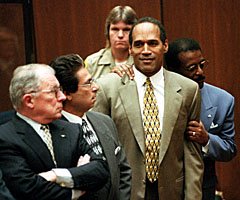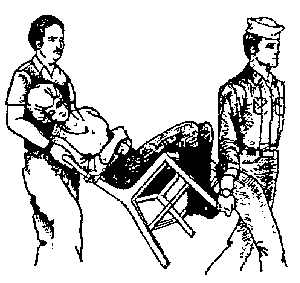
"The Gospel is death to action/consequence thinking."
I don't want to debate whether or not the above quote is truly reflective of an idea found in the Bible, though I'm sure it is. But if it is, then what? Does the death of action/consequence have relevant implications, and, if so, do these implications necessarily trump the other thoughts with which they grapple? Me thinks yes.
Remember Rod Rosenbladt (the teen-ager)? He gets drunk. He totals his father's car. His dad picks him up at the scene of the accident, drives him home. When they get home, they go into the living room where the father asks: "How do you feel?" Rod breaks down in tears, knowing full well that he is now officially "grounded" for the rest of his life. His father looks at him and says: "Do you know what I think? I think you need a new car. I'll meet you at the automobile dealership during my lunch hour tomorrow." Rod gets a new car, better than the one he totaled. !!!
The Gospel is offensive. It kills action/consequence. Does God really reward ungodliness? (Romans 5:6)...or likewise, "Are you saying I'm incapable of doing anything good on my end?" Yes, exactly. These questions are implications of the notion, certainly. Similarly, this (so-called) Good News views the guilty as being presumed innocent, with the penalty being paid by one who deserves it not at all. Are you kidding? No, this is the radical nature of the Gospel, which states that "Christ died to save sinners".
Did you read the article on MSN.com with the headline: "Is Martha Stewart getting the cush treatment in jail?" We don't want her getting off lightly for what she did, now do we? That would be an improper expression of justice, where she would not be fully paying the amount of debt she deserves,...or so the thinking runs.
 I remember seeing two young children on a playground. One of them was crying. The other, a slightly older girl (most likely the older sister) was saying: "You go ahead and cry. You're just mad that you're gettin' what you deserve for doin' what you did!" Again, an expression of action/consequence, and, in this instance, found already as a naturally occurring thought in the mind of a young child. One might say we are wired to interpret life in the light of a law of action/consequence.
I remember seeing two young children on a playground. One of them was crying. The other, a slightly older girl (most likely the older sister) was saying: "You go ahead and cry. You're just mad that you're gettin' what you deserve for doin' what you did!" Again, an expression of action/consequence, and, in this instance, found already as a naturally occurring thought in the mind of a young child. One might say we are wired to interpret life in the light of a law of action/consequence. Strangely, or at least consistently, when the paradigm of action/consequence is strayed from, people always get pissed off. Things are not supposed to happen unfairly. But they do. Mom used to tell me that, "life isn't fair", and she was right. Welcome to a fallen world, one where effort is often rewarded with poor results, one where class stratifications rise unjustly to the fore, based upon unmerited achievement (i.e., blood and crest). How frustrating that so few good jobs are won by hard work, but, rather, are had through a complex network of "connections". Not fair!
But what else does this idea imply? Well, for one thing: if I do something, a certain outcome (or consequence) will follow. This is how the train of thought goes. Thus, we spend a lot of time viewing our lives through the lens of "decision-making".
 Show me a contemporary Hollywood movie that does not appeal to ideas of "choice" and "decisions" whenever it tries to get wise. The idea is that, in front of all people lay a certain number of anticipated options, A, B, C, D, and the like. Usually most people think there are either two, or three options, and that they have to figure out which one is the best, or the right choice, etc. Subtext: "If I choose A, things will work out best for me...I just have to figure out which choice is A."
Show me a contemporary Hollywood movie that does not appeal to ideas of "choice" and "decisions" whenever it tries to get wise. The idea is that, in front of all people lay a certain number of anticipated options, A, B, C, D, and the like. Usually most people think there are either two, or three options, and that they have to figure out which one is the best, or the right choice, etc. Subtext: "If I choose A, things will work out best for me...I just have to figure out which choice is A." But here is where the waters get murky. Say you choose A correctly, having actively asserted yourself in the opposite direction of choices B and C. Isn't that supposed to work? It never does, but, by that point, we once again appeal to the same mode of thought in order to deal with the unfair outcome. Either I go for it again, trying this time to leave no stone unturned (which was the mistake I made last time), or I find some new choice that needs to be made in order for me to be able to fully appreciate the positive outcome of the initial choice I made accurately. But there is never an oozing into the comfort that comes from having finally made the right choice successfully. This stupid creature of thought always gives birth to a new, seemingly more advantageous "opportunity" upon which I must seize. It's like the father in Woody Allen's 'Radio Days' who always comes up with a new, "better" get-rich scheme for his family, one that will insure comfort and success, finally.
 (For me, it runs like this: "I got a 5% cashmere-blend sweater...but what I didn't realize at the time was that I really just needed to get a 100% pure cashmere sweater from the get-go,...but then I get the pure cashmere sweater, and I love it, don't get me wrong, it's just not the right color; it doesn't look or fit the way I thought it would..." Suddenly I've got a parenthetical "63" next to my ebay username! You think I could make this story up? This is the stuff that all tragedy is made of. Missed opportunity, and/or next opportunity, etc. Choices, decisions, choices..."I can't win!" Why do I need a gosh-darn vacation in order to recover from the highly-anticipated vacation I finally got to take? Same thing. And the thing is not a fun thing, no, the thing is an ugly thing, my life, I hate the thing. Why don't I learn from my mistakes? Stupid Romans 7 again!)
(For me, it runs like this: "I got a 5% cashmere-blend sweater...but what I didn't realize at the time was that I really just needed to get a 100% pure cashmere sweater from the get-go,...but then I get the pure cashmere sweater, and I love it, don't get me wrong, it's just not the right color; it doesn't look or fit the way I thought it would..." Suddenly I've got a parenthetical "63" next to my ebay username! You think I could make this story up? This is the stuff that all tragedy is made of. Missed opportunity, and/or next opportunity, etc. Choices, decisions, choices..."I can't win!" Why do I need a gosh-darn vacation in order to recover from the highly-anticipated vacation I finally got to take? Same thing. And the thing is not a fun thing, no, the thing is an ugly thing, my life, I hate the thing. Why don't I learn from my mistakes? Stupid Romans 7 again!) The (AA) Big Book asks a wonderful question along these lines: "Was I not a victim of the delusion that I could wrest (i.e., wrestle) happiness and satisfaction out of this world if I only managed well?" What a quote! If I manage well, happiness and satisfaction will follow. The sentiment is a perfect description of what most people believe. "The reason life hasn't worked out better is because I have made poor choices, ..." by reasserting one's self more carefully and/or deliberately, will not better results follow? Well, if experience is anything to go on, the answer is a disappointing "No." The idea is a "delusion".
It is when attempts fail repeatedly that this more realistic/pessimistic vantage point starts to gain sway. But where does this leave us? How does this cause us to view our lives? Are they just supposed to unravel? Well, in an important sense, the Christian response answers this (desperate) question affirmatively. The idea is that an individual has very little power, or, rather, lacks the only kind of power that they actually need, that kind which makes and discerns the right choices. This is the ground upon which ethics (of any traditional variety) are slain. This is the most vulnerable of all places on earth, man at the end of his rope. But it is a good place. "Godly sorrow produces repentance, leading to salvation, leaving no regret" (2 Corinthians 7:10). It is the only zone that rightly addresses the problems of life, all-the-while acknowledging the only possible solutions to them (i.e., those that intervene upon us).
 Would that we could all become so appropriately unbound. When choice dies its painful death, right ethics begin to flow. I promise. As Fitz Allison says, "you know you're getting close to the Gospel when people start worrying about things atinomian."
Would that we could all become so appropriately unbound. When choice dies its painful death, right ethics begin to flow. I promise. As Fitz Allison says, "you know you're getting close to the Gospel when people start worrying about things atinomian."Consider the words of the Psalmist: "This poor man cried out, and the Lord saved him from all his troubles." (34:6)
--JAZ



15 comments:
Amen. Brilliant post John.
John, this is the highlight of my week! I am printing it out and saving it. Thank you! -Colton
john, i hope you don't mind me pointing out, perhaps on behalf of many of us, your loyal blog following, that probably the two very best things you have posted-- out of a very wide selection of great material you have put up here-- are things you have written yourself. i am thinking specifically of this post and what you wrote in response to a comment on the theology of the cross/ theology of glory article. would love to hear more of what you have to say, anytime you feel inspired! it is "water in the wilderness, rivers in the desert" (is. 43:20).
Yeah...I kept hearing about some paper on the Gospel and Psychology that I've been wanting to read...
I have sent all of Birmingham to read this. I second all of these emotions-Smokey
JAZ,
I don't think I am clear on exactly what you are saying in this entry.
You are rejecting what you take to be a popularly held ethical theory called 'act consequentialism', claiming that human sinfulness defines us to such a degree that it is impossible for us to chose or act rightly at all - and therefore the consequences of our actions are morally irrelevant, at least in the eyes of God. I hear you saying that life is not fair. I think you are upholding the 'fact' of a basic kind of psychological egoism (that every action is for the benefit of the agent) and suggesting that Christian action is not, or should not be, motivated out of a desire for gain. And you are placing the emphasis on God's grace. Great.
But maybe you can help me to understand you further. You propound a 'realisitic/pessimistic' anthropology that entails the death of Ethics (in the traditional sense). Only then, at the end of our rope, can grace come in and 'right ethics start to flow'. I would like you to say what all of that means. Apart from Rod Rosenbladt and cashmere cardigans, what is 'right ethics' in your understanding? What does it consist in? Do our choices matter at all? You reject the idea that we are able to act rightly. So we repent...then what? What kind of life is a Christian supposed to live? How do you square your reflections with Christ's command to be holy as he is holy? I guess what I mean is, is there any GOOD news in your crypto-lutheran version of the Gospel?
Otherwise, entertaining read.
BFC
The right ethic is impact that God's intervening love for the sinner has upon the human heart. I am no psychological egoist (see also: South Park's episode on Ayn Rand, season 2), but believe an action is only righteous to the extent that is has been intervened upon/apprehended by God's grace. This is not the traditional approach to Good News, no, it is not a pill that one swallows in order to feel better, but rather a much deeper kind of Good News: "The thirst for glory is not ended by satisfying it but rather by extinguishing it." You can tattoo the following words on my chest: Low Anthropology/High Christology. The call to discipleship cannot be interpreted without taking the cross into account. What does the cross say about our stand-alone ethics? That they are in some way sufficient? No, no! Article 13 for you Anglicans. Things are not so simple as nature would have us assume. On ethics, check out Karl Holl's "The Reconstruction of Morality". Here's an excerpt: "the highest goal is not attained where rational deliberation makes the correct choice among various possibilities of action. Action is truly moral, truly free, only when the good has become so instinctive that the only thought that presents itself is the correct one and this is at once implemented."
All of that said, if action/consequence thinking is removed from an understanding of life, what happens? For one thing, the notion of a present moment evaporates. You are close to my way of thinking when you state: "So we repent...then what?"
I say Exactly.
The point is that Christianity is a different language that cannot be reduced to any form of a Pelagian understanding of the will. This is a total fault-line shift of paradigm, the kind of thing that leaves me thinking, "Wow, something really has changed in light of my Christian faith, and that something is everything!"
The commonly held human sentiment about life, and the Biblical one implied by consequence of the Gospel are like two ships in the night. No man has ever seen God.
John, While I think it is the case that many Xians do not know the Gospel, I think you are one of them. You are most likely going to end up in hell. -Andrew
I once saw John Zahl eat an entire fruit cake in one sitting while telling me about Burke Hilsabeck tempting him to drink 15 milkshakes from McD's. He is a testimony to the bondage of the will. (He might be the only one though.)
My interest in this little essay has to with the kinds of things that exist in tension with a "Christian World View" (i.e., as preachers do, they call sin as they see it, and I really see the conclusion of this stream of thought to be one that convicts us as sinners, to the core, or how we are, not by what we do. Fallen ontology, etc.). When we despair of finding the good in ourselves, we can then find it in Christ. To quote Richard Hooker: "My eager protestations, made in the glory of my ghostly strength, I am ashamed of; but those crystal tears, wherewith my sin and weakness was bewailed, have procured my endless joy; my strength hath been my ruin, and my fall my stay." This ultimate truth shines the greater for having the cobwebs (or sin, evil, and fallen-ness) swept from it. In fact, like CS Lewis points out, the closer you get to the sun (i.e., the Gospel) the bigger the shadows (i.e., the more total the fallen need for salvation). We don't come to God through virtue, but rather He comes alongside us in our broken-ness. I couldn't dare consider things so awful if I did not know of things so sweet.
Furthermore, in writing it, I was both trying to expound on how the Bible speaks in a non-"Biblical Theology"/non-New Perspective sense, and also trying to apply the straight-up Lutheran preaching technique to an essay without once needing to mention Luther, because none of this has anything to do with him really, anyway, except in the same way that it has to do with all of us. It's just as Cranmerian to think this stuff as it is Lutheran after all. Also, I wanted it to be accessible/readable to non-Christians and Christians alike. As far as I'm concerned, sin is the only level playing field, so, of course, the picture appears pretty bleak. But it is also the road to the heart, the cheesey cheesey heart. I got the idea while lying in bed last night, though I had thought about this stuff a fair amount before writing it. The main impetus came from writing a response to some New Perspective critiques of church doctrine, which can be found (despite its polemic) in the comments under the "PZ on Anne Rice" post. Sometimes it seems that theologians don't think the Bible can preach outside of a Second Temple context and I wanted to do my part in sharing how it does just that to me, all the time, without the New Perspective or "Biblical Theology" or expository stylings even entering the picture. I have been afraid to really write my own thoughts on this blog as I don't feel they are finished, and I don't really enjoy the idea of inviting diagreement. But I do have a few things to say, I guess, and people seem interested. This blog actually had over 200 individual visitors today, which amazes and thrills me. I hope that helps to explain the thing a bit.
Also:
Andrew P, you are just mad because your Grandmother won't leave Wycliffe. Folks, she came to visit for 17 days! Can you imagine?!
--JAZ
John, I agree with the senitments posted here as well. As much as I enjoy your eccentric humor, your theosophic (hey, Shakespeare made up words too!) writings are the raisins in the bran. :-)
Karl Holl is absolutely right. People see who they truly are at the point when their spontaneous, uncoerced actions transect their lives (especially powerful at the point of crisis!). Of course, one must be given to introspection to even recognize this phenomenon--perhaps ignorance is bliss?
It is at those instances (I've fallen and I can't get up!) that we find ourselves to be the chief of sinners, unable to repress our illusions as we live Coram Deo.
Keep it up, I like the cut of your jib old boy.
John,
Nice post! One response asked “How do you square your reflections with Christ's command to be holy as he is holy?” I can try to speak to that. I have lived through the very depths of this question, which you well know. When Christ commanded us to be holy, he meant it to the fullest. We are entirely unable to meet this goal ourselves. However, Christ has met it for us. I attempted to meet the goal myself, and wound up living a sort of compromise between trying to nail myself to the cross and trying to accept grace at the same time. You cannot do both, grace is too high, sin is too low. The vast expanse between the sinner and the Lord is so great that we will never meet the standard. "There is no one righteous, not even one . . .” Human nature is so deeply flawed, so completely wrecked, that we have nothing to offer. Grace is so complete, so full, and so counterintuitive, that we have amazing difficulty in accepting it. It is too wonderful! But what about the time we spend from now until the Lord comes back? This is where I became tripped up, and started “backsliding”, not in my actions but in my faith, and the difference is key.
Human nature is flawed, we don’t need new actions, we need a new life. Our actions come out of who we are, and the Lord supplies a new life for us to draw from. Jesus is the new human nature.
Still, we are called to be holy as he is. We can do nothing within ourselves to meet this staggering command. This is not possible without the life of Christ in us. We bring nothing to the table, we have nothing to offer. Everything flows from the Lord. All good things come from him, any attempt on our part will eventually, if played to its fullest, bring us back to the cross on our knees. Hallelujah! What a crushing defeat in ourselves. What a wonderful victory in Christ!
So, how do we follow the Lord’s command to be holy as he is? We don’t. He does! "I am the vine; you are the branches. If a man remains in me and I in him, he will bear much fruit; apart from me you can do nothing.” He is our life, and anything that ever comes out of us that is holy is flowing from his life, and his nature, not ours. We assume a posture of continual repentance, and total reliance upon his mercy, his love and his absolute saving grace and power to do so. I think it is summed up nicely in John: “Then they asked him, ‘What must we do to do the works God requires?’ Jesus answered, ‘The work of God is this: to believe in the one he has sent.’”
Peace,
Art
JAZ,
I want to thank you for your thoughtful essay and responses over the last 24 hrs. I especially appreciate your moment of transparency in which you identify your hesitation to write your own thoughts because they are not finished. I think THAT is what you should be doing. It is precisely in this kind of context of generous question and answer, proposal and challenge that your ideas will find their sharpest expression. I think you are doing a REALLY great job. I (also) like the cut of your jib - what ever that means. No need to tattoo things on your chest. I hope the questions you find posted here help to that end. The worst thing would for JohnCamp to develope into a JAZ fan club (that is what my blog is going to be for). So can I ask one further question? You don't need to answer it any time soon. Think on it and let me know.
Here is my concern: Jesus says that he has put before us the choice between life and death. I think that means that in him 'life' is really possible for us - not just in the sweet by and by, but in the here and now (at least to some degree). Yes, we must acknowlege that we are dead in our sin, and, yes, we cannot work our way out. But I would hate to miss the new-ness of life promised by Christ and paid for by the cross because I had over-prioritized my low anthropology. What do you think?
And, it seems to me that there is an ethical component to having a new life in Christ. Paul suggests that 'virtue' is given to us, and worked in us, by the Holy Spirit. Christian action is obedient to God's leading, and graced-obedience. Think of the fruits of the Spirit, they are all action-related: patience, kindness, love, peace, etc. So, what I am suggesting is that it is possible to articulate a vision of Christian life and practice that avoids pelagianism, but still allows for real transformation. God graces us with forgiveness for our sin, but also changes us into his own image by transforming us into channels of his loving action in the world. But, we never get to claim the credit (I think that is part of what you are concerned about). So, being holy as Jesus is holy has to do with saying, like Jesus, "not my will but yours be done". It means becoming passive (to the Spirit) in our concrete action, so that our activity (in grace) is his, not ours. I also have a low anthropology! But I have hope that in Christ, by his Spirit, I can be made into the image that God created me to be. I don't want an over-realized eschatology. I don't want to prioritize the 'not yet" over the "now". But, I do want a vision of life in Christ that sees the human life as different than as purely enslaved to sin. That is what I think Jesus promised. That is what I think Paul meant - forget the new perspective. So...sanctification, I guess. But, how would you approach things differently? I need your critique as much as you need mine.
Thanks again! I love this site! See you tomorrow.
BFC
p.s. - 17 days?!
BFC –
It sounds like the root of your question is what is our role in all this? This is the classic justification and sanctification question, or now that I’m a Chrisitan now what? I’ve been wrestling with this question and reading/thinking about it for a while. I think the natural answer is always ethics – ie give me a list of things to do or a person to emulate. Now that I’m a Chrisitan – let me go live it out right?
What happens when you don’t experience this newness of life? When there is no fruit falling or you feel the weight of the world pulling you down? Do you apply more spiritual disciplines? To become more demanding or gracious as it were.
I believe, and have seen it in my own life, that ‘growth’ is cyclical and not linear. That my sanctification is a continual cycle of life & death – of me taking my will back to ulitamtely screw up again and then letting go when I run out of options (death). For the good news to be truly good news I don’t think it can be qualified on the basis of our performance (ethically or otherwise). Does that mean we go on sinning (as Paul says) – no. Ethics will come in light of the gospel. Only the gospel can give life; the law only convicts & kills. That’s why its vitally important for us to constantly hear the gospel proclaimed to us because we have these built in forgettors (and we’re still sinners even though we’re Chrisitans). To the extent that the law can ‘instruct’ it will always bring us back to that place where we fail because the law lacks power to create life – only the power to drive us to either despair or self-righteousness. My life continues to show that thought I’m free from the penalty of sin (through Christ), my will is still inexpecably bound to sin (Simul Justus Et Peccator). Ask my wife, she’ll confirm that one for you. In spite of the fact I know better, I often find myself doing that which I don’t want to do – talking poorly about others, saying one thing and doing another --- you know the drill – basically failing in some way.
My hope is not so much that I can be made into the image of God in this life, but that Christ’s death on the cross is sufficient – in other words to hope in the promise.
Did I ever tell you about the time I went horseback riding with John Zahl, but there weren't any horses around? Well, John throws a saddle on my back and rides me around Wyoming for three days. Well wouldn't you know it my stamina increases with each day and I develop tremendous leg muscles. So anyway, John Zahl decides to enter me in the Breeders Cup, right? Under the name Turkish Delight. And I'm running in second place, and I'm running and I break my ankle! They’re about to shoot me. Then someone from the crowd yells out, 'God bless him, don't shoot him — he's a human.'
That may or may not be literally true, but either way this post is awesome.
Post a Comment